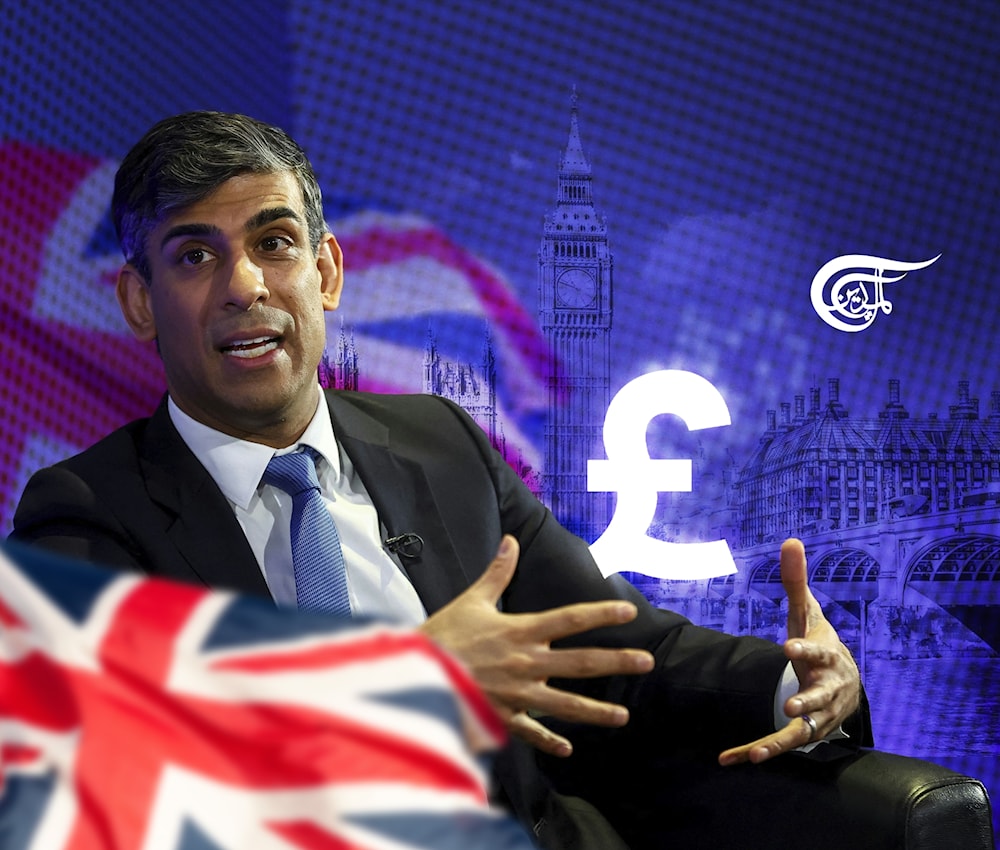How to survive on a budget
An incoming UK government will be faced with levels of tax burdens not seen since the immediate wake of the Second World War, with little capacity to reduce them.
-

Having been forced into a corner by the Tories’ tax cuts, labour are now faced with what the BBC’s political editor described as the “headache”(Illustrated by Mahdi Rteil to Al Mayadeen English)
This month, the British Chancellor announced what should turn out to be the UK government's last full budget before the country’s next general election.
It had certainly been seen by many political commentators and many within his own party as the Conservatives’ last bid to the electorate to let them cling onto power.
Following worse than expected economic forecasts – and the news that the nation had just dipped into recession – the Tories’ hopes for a big cash giveaway had been severely dashed.
Much to the dismay of many of his party’s hardline backbenchers, there was no way that Jeremy Hunt was going to follow the precedent set by his immediate predecessor, whose own mini-budget ignored the advice of the Office for Budget Responsibility, plunged the country into financial chaos, and forever sealed the reputation of his boss – Britain’s shortest lived premier, Liz Truss – into the annals of moronic notoriety.
Mr. Hunt did what he could, of course, to make people feel a little bit better about their fortunes as we languish in the last stagnant stages of a cost-of-living crisis that has blighted the lives of so many ordinary families. He cut two per cent from national insurance, a direct contribution taxpayers make (as a proportion of their incomes) to their pension and benefits rights.
But he’d done exactly the same thing in his autumn statement less than four months earlier, and that had hardly boosted his party’s popularity or set the British people’s minds alight with gratitude at his munificence.
His other major move was to announce that, in April 2025, the Treasury would rescind the tax-free arrangements currently in place for foreign nationals in the UK who claim non-domiciled status.
This is a matter which might be seen as controversial – or utterly uncontroversial – as it is already a flagship policy of the opposition Labour Party, which is widely expected to be in power in a year’s time anyway.
It may however be considered of particular interest as the Prime Minister’s own multimillionaire wife enjoys this non-domiciled tax status – although she started paying tax, on a purely voluntary basis, when this embarrassing fact was brought to light by the British press two years ago.
There are those who might suppose that this fiscal gambit might plant a wedge between the premier and his chief finance minister. There are others, however, who suppose that Jeremy Hunt is Chancellor in name only, and that it’s former Treasury boss Rishi Sunak himself who continues to hold the purse-strings of his administration.
It remains to be seen whether this budget’s last desperate (yet modest) political gamble with the country’s finances and its immediate economic prospects will be enough to help Mr. Sunak’s premiership survive.
Yet some analysts have suggested that this budget doesn’t represent a Tory ruse to hang onto power beyond the next general election, but is in fact a pseudo-suicidal strategy to regain it at the election after next, by saddling an incoming Labour government with the curse of major spending cuts, and effectively scuppering from the outset their hopes for the regeneration of public services and green industries in the UK.
Having been forced into a corner by the Tories’ tax cuts – which for electoral reasons they’ve felt obliged to embrace – Labour are now faced with what the BBC’s political editor described as the “headache” of working out how they can possibly pay for their core policy promises.
It’s not after all that Labour have a lot of wriggle room to raise taxes in order to fund their plans. Analysis presented by the independent think tank the Resolution Foundation – which works to advocate for the interests of lower income families – has pointed out that Mr. Hunt’s latest tax cuts have been dwarfed by recent and planned Tory tax rises. This is an analysis which the right-wing Institute for Fiscal Studies has also advanced.
The Resolution Foundation has also pointed out that, thanks to a year of raging inflation, the continuing freeze of the income threshold at which tax is first paid has, even with these cuts to national insurance, left the least advantaged people in the country even worse off than they were before.
An incoming government will therefore be faced with levels of tax burdens not seen since the immediate wake of the Second World War, with little capacity to reduce them.
It will have poor prospects of affording measures that might promote social welfare and stimulate an economic recovery sufficient to restore an ailing nation’s coffers towards something approaching fiscal health.
So, sincere congratulations, Sir Keir Starmer, on what most pundits presume will be your impending electoral victory – and heart-felt commiserations on what seems most likely to happen next.

 Alex Roberts
Alex Roberts
 5 Min Read
5 Min Read











